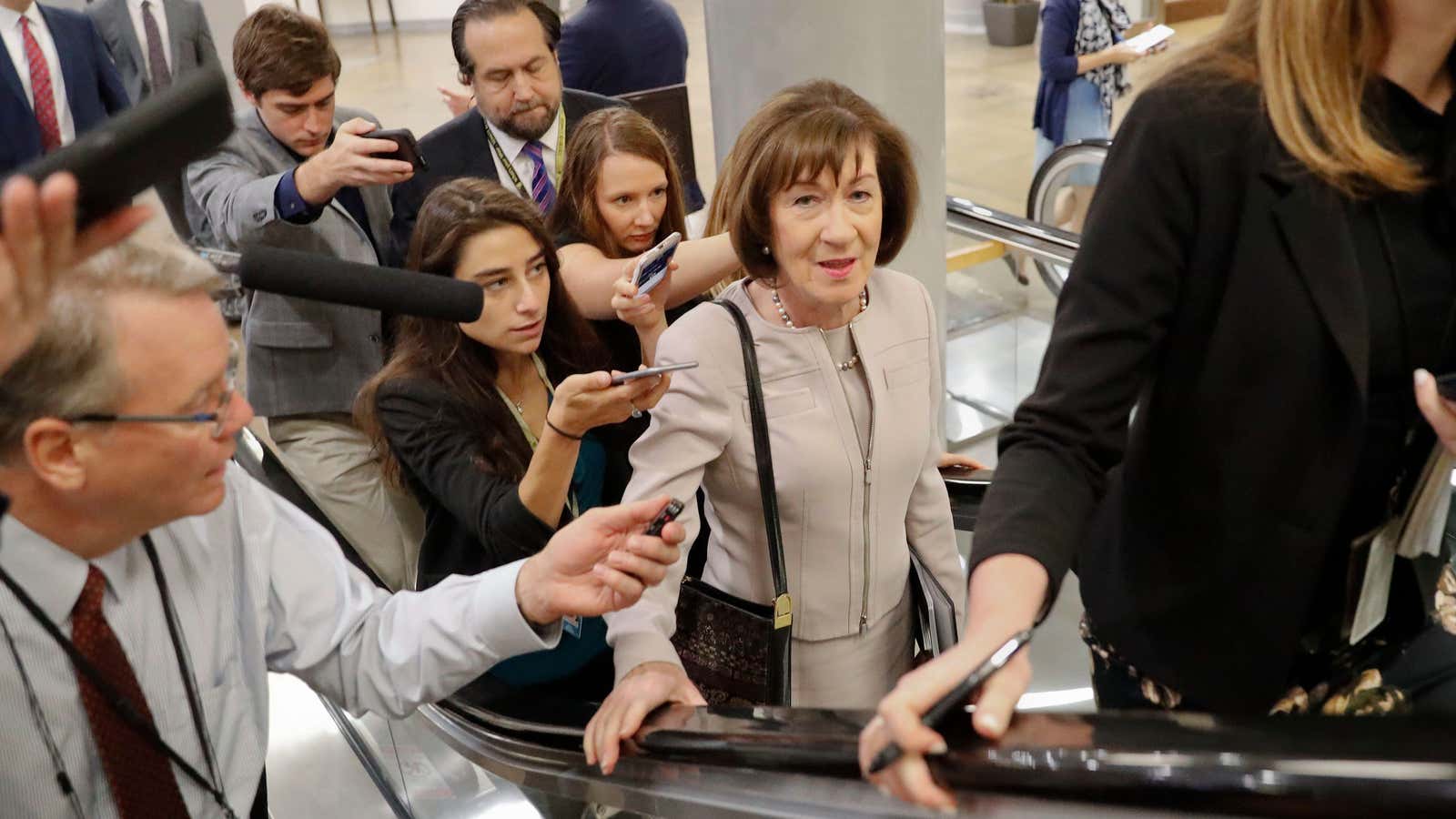Senator Susan Collins, the Republican from Maine, explained why she would support Brett Kavanaugh on the Senate floor Friday afternoon, essentially guaranteeing he will be the US’s next Supreme Court justice.
Collins, a moderate Republican who did not support Donald Trump in 2016, decried the politicization of the process, defended Kavanaugh’s record as a judge, and said there was not enough evidence to believe the women who accused him of sexual assault. With Collins’ support, Kavanaugh’s confirmation vote, scheduled for tomorrow, is expected to pass, 51 to 49. Moments after Collins’s speech, Joe Manchin, the undecided Democrat, also said he would vote to support Kavanaugh.
“We have come to the conclusion of a confirmation process that has become so dysfunctional that it looks more like a caricature of a gutter-level political campaign than a solemn occasion,” Collins said in her speech. She was scathing about Democratic opposition, citing ”special interest groups whip their followers into a frenzy by spreading misrepresentations and outright falsehoods” about Kavanaugh’s record, and “spent an unprecedented amount of dark money” opposing the nomination.
“When passions are most inflamed, fairness is most in jeopardy,” Collins said.
As if to prove her point, as Collins took to to the podium, protesters in the Senate gallery started yelling “Senator Collins Vote No!”
Kavanaugh’s record
Collins said she has spoken to Kavanaugh for hours, and relied on a team of attorneys from the Congressional Research Service to analyze his record on the bench.
Quoting extensively from Kavanaugh’s own decisions, Collins said she said she thought Kavanaugh’s opponents’ concerns that he could strip rights for same-sex marriages, the Affordable Care Act’s coverage of pre-existing conditions, or birth-control rights were overblown.
“We don’t make decisions based on who people are, or their policy preferences, or the moment,” she quoted from one of Kavanaugh’s decisions. “We make them based on the law.”
Kavanaugh and Merrick Garland, the Barack Obama Supreme Court nominee who Republicans refused to meet with or vote for, voted the same way in 93 percent of the cases they heard on the DC appeals court, Collins noted.
She addressed concerns that Kavanaugh could be beholden to special interests, saying Kavanaugh “unequivocally assured me that he has not” made any pledges to the Federalist Society, or other conservative groups to forward any ideology.
Collins also discussed concerns that Kavanaugh would elevate Donald Trump’s powers and eliminate checks on the executive branch. ”Judge Kavanaugh has been equivocal in his belief that no president is above the law,” Collins said, citing three court cases where Congress served as a check on presidential power.
Roe v. Wade
Protecting Roe v. Wade, the 1972 Supreme Court decision that protects a woman’s right to choose to have an abortion, ”is important to me,” Collins said.
Kavanaugh has said that following precedent is constitutionally dictated “except in the most extraordinary circumstances.” In short, she said “his views on honoring precedent would preclude attempts by stealth that which one has committed not to do overtly.”
Decisions “become part of our legal framework” over time, Kavanaugh told her.
The Republican platform has included the pledge to overturn Roe v. Wade since 1980, she noted, and Trump has promised to nominate judges that will do the same. But the Supreme Court justices that were nominated by Republicans since 1980 have not overturned the decision, and in some cases have reinforced it with later rulings, Collins said.
“Suffice it to say, prominent advocacy organizations have been wrong,” Collins said.
Sexual assault allegations
Most notably, Collins indicated that she believed Kavanaugh’s denials over the woman who accused him of sexual assault or misconduct.
The Senate confirmation process is “not a trial,” but certain elements like due process and the presumption of innocence “do bear on my thinking and I cannot abandon them,” Collins said.
Christine Blasey-Ford’s testimony is “sincere, painful, and compelling,” she said. “I believe she is a survivor of sexual assault,” she said, but none of her witnesses could corroborate the incident. “None of the individuals she said were at the party” could confirm it, and Kavanaugh and his friend Mark Judge denied it.
None of her friends “called her the next day to ask her why she left, or if she was okay,” Collins said. The facts lead her to conclude the “allegations fail to meet the ‘more likely than not’ ” standard.
What Collins didn’t say
The senator didn’t address concerns about Kavanaugh’s temperament that were raised after his Sept. 27 hearing, where he gave an emotional, partisan opening statement and treated Democratic senators with contempt. The National Council of Churches called for Kavanaugh’s nomination to be withdrawn based on his behavior then, as have more than 2,400 law professors.
She also didn’t address criticism that the FBI investigation into sexual assault allegations didn’t interview Kavanaugh, Ford, or several character witnesses who have said publicly his drinking was problematic.
Collins’s has been an influential moderate and an occasional check on Trump since his inauguration.
After Trump met with Vladimir Putin in Helsinki in July and failed to condemn Russia’s meddling in the US election, Collins called Trump’s position “untenable and at odds with the forceful response this moment demands.” Last year, she said she could not support one of several Republican healthcare bills to repeal Obamacare, and was called a “feminazi” and “RINO” (for Republicans in Name Only) by a website that also made fun of her voice.
Collins didn’t support Trump ahead of the 2016 election or endorse him after he won the Republican nomination. She’s not up for reelection until 2020, and was one of the US’s top ten most popular Senators as of July, with a 56% approval rating, much higher than Trump’s.
“My fervent hope is that Brett Kavanaugh will work to lessen the divisions,” in the court, and in America, Collins said in closing.




